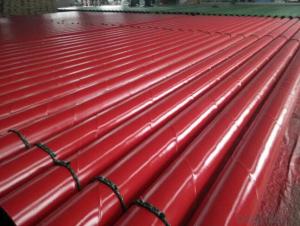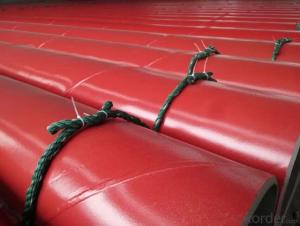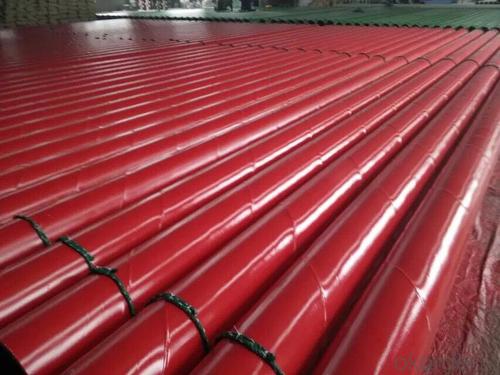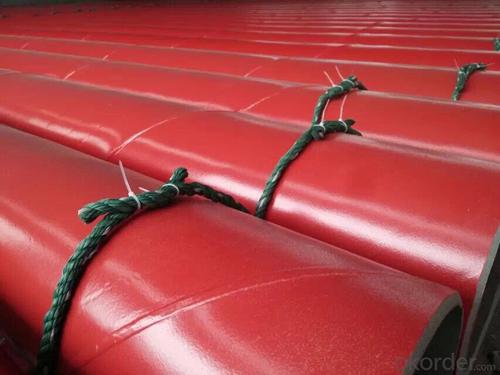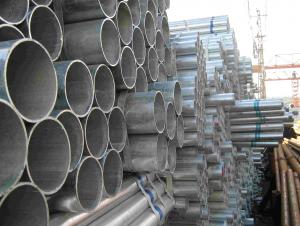SSAW 3 PE steel pipe external coating
- Loading Port:
- China Main Port
- Payment Terms:
- TT OR LC
- Min Order Qty:
- -
- Supply Capability:
- -
OKorder Service Pledge
OKorder Financial Service
You Might Also Like
Specifications
water pipeline inner-layer tape
1 Butyl rubber as adhesive
2. SGS test report and DVGW certificate
3. corrosion protection
water pipeline inner-layer tape
State-of-the-Art Pipeline Protection for All Climates & Environments
System description:
WATER PIPELINE Inner -layer tape also be called pipe wrap anti-corrosion tape, polyethylene wrap tape.
water pipeline Inner-layer tapeT100 is engineered to assure a high bond to the primed pipe surface with excellent conformability characteristics, aggressive adhesive for corrosion protection and repair of main line coatings.
Inner-layer tapeT100 series is cold applied tape coating system for corrosion protection of Oil, Gas, Petrochemical, and Waste Waterburied pipeline, pipe can be buried, also can be underground ,overhead ,onshore and offshore .
Structure of water pipeline inner wrap tape
The specification of the tape consists of two layers, adhesive layer and film backing
Adhesive: butyl rubber
Film backing: Special blend of stabilized polyethylene
Features & Benefits
Provides a permanent bond to the primed steel pipes surface and provides protection against chemical electrolytic corrosion for underground pipelines.
long term corrosion protection
Worldwide reference lists. Established in-ground history
High chemical resistance under service temperature.
Outstanding electric property and permanent adhesion.
Cold applied, No release liner. Makes installation fast and easy.
Complies with EN-DIN 30672 and AWWAC-214 international standards and also ASTM standards.
Be used for water pipeline corrosion protection
System Properties
Type | T138 | T 150 | T165 | T180 | T 250 | T265 | T280 | |
Thickness | 15mil 0.38mm | 20mil 0.508mm | 25mil 0.635mm | 30mil 0.762mm | 20mil 0.508mm | 25mil 0.635mm | 30mil 0.762mm | |
Backing | 9mil 0.229mm | 9mil 0.241mm | 10mil 0.25mm | 10mil 0.25mm | 15mil 0.38mm | 20mil 0.508mm | 25mil 0635mm | |
Adhesive | 6mil 0.152mm | 11mil 0.279mm | 15mil 0.381mm | 20mil 0.508mm | 5mil 0.127mm | 5mil 0.127mm | 5mil 0.127mm | |
When used for ductile iron pipes inner layer 980-20 or 980-25 and outer layer 955-20 or 955-25 are recommended. | ||||||||
Elongation | ³300% | ³400% | ||||||
Tensile Strength | 55 N/cm | 70 N/cm | ||||||
Color | Black | White | ||||||
Peel Adhesion to Primed Pipe | 33 N/cm | |||||||
Dielectric Strength | 30 KV | |||||||
Dielectric Breakdown | 26 KV/mm | |||||||
Cathodic Disbandment | 0.24 in radius 6.4 mm | |||||||
Water Vapor Transmission Rate | < 0.1% | |||||||
Volume Resistivity | 2.5 x 1015 ohm.cm | |||||||
Impact resistance | 5.5Nm | |||||||
Penetration Resistance | <15% | |||||||
Performance | AWWA C-209,ASTM D 1000,EN 12068 | |||||||
Order information
Length | 100ft(30 M),200ft(60 M),400ft(120 M),800ft(240 M) |
Width | 2’’(50mm),4’’(100mm),6’’(150mm),17’(450mm),32’’(800mm) |
- Q: What is the role of steel pipes in the telecommunications industry?
- Steel pipes play a crucial role in the telecommunications industry as they are used for the installation of underground and overhead telecommunication cables. These pipes provide protection and support to the cables, ensuring their safety and longevity. Additionally, steel pipes are also used in the construction of communication towers and infrastructure, making them an essential component in establishing and maintaining reliable telecommunications networks.
- Q: Can steel pipes be used for swimming pool installations?
- Yes, steel pipes can be used for swimming pool installations. Steel pipes are known for their durability and strength, making them a suitable choice for underground or aboveground swimming pool plumbing systems. They are capable of handling high water pressure and can withstand the corrosive effects of pool chemicals. Additionally, steel pipes are resistant to extreme weather conditions and can be easily installed and maintained. However, it is important to ensure that the steel pipes are properly treated and coated to prevent rust and corrosion.
- Q: What is hot rolled steel pipe? What is a cold drawn steel tube?
- General use seamless steel tube: is with 10, 20, 30, 35, 45# and other high-quality carbon steel, 16Mn, 5MnV and other low-alloy structural steel or 40Cr, 30CrMnSi, 45Mn2, 40MnB and other alloy steel hot-rolled or cold rolled. Seamless tubes made of low carbon steel, such as 10, 20, are mainly used for fluid delivery pipelines. 45. Seamless tubes made of medium carbon steel such as 40Cr, used for the manufacture of mechanical parts, such as parts of automobiles and tractors. General use of seamless steel pipe to ensure the strength and flattening test. Hot rolled steel tubes are delivered in hot rolling or heat treated conditions. Cold rolled in heat treated state.
- Q: Can steel pipes be used for underground applications?
- Yes, steel pipes can be used for underground applications. They are commonly used for various purposes such as water and sewage systems, natural gas and oil pipelines, and underground infrastructure projects. Steel pipes are durable, strong, and resistant to corrosion, making them suitable for underground environments.
- Q: What does "1.5" steel tube mean?
- 1.5 inch [1 1/2 steel pipe, outer diameter 48.3mm, 1.5 inches, refers to the pipe bore is approximately the inner diameter (25.4x1.5 = 38.1mm). [DN40] the specific parameters of the steel pipe are as follows;The average wall thickness is: 3.5mm;The minimum wall thickness is 3.06mm,Nominal diameter is 40mm,External Jing is 48.3mm,
- Q: Can steel pipes be used for conveying potable water?
- Yes, steel pipes can be used for conveying potable water. However, it is important to ensure that the steel pipes are coated or lined with suitable materials to prevent corrosion and contamination of the water supply. Regular maintenance and monitoring of the pipes are also necessary to ensure the water remains safe for consumption.
- Q: What is the importance of corrosion resistance in steel pipes?
- The importance of corrosion resistance in steel pipes is crucial as it helps to extend the lifespan of the pipes and maintain their structural integrity. Corrosion can weaken the pipes, leading to leaks, breakages, and ultimately, costly repairs or replacements. By preventing or minimizing corrosion, steel pipes can effectively transport fluids or gases, ensuring safety, efficiency, and longevity in various industries such as oil and gas, water supply, and construction.
- Q: How do you protect steel pipes from external damage?
- There are several ways to ensure the protection of steel pipes from external damage: 1. Coating: To prevent external damage, it is advisable to apply a protective coating on the surface of the steel pipes. Different coating options such as epoxy, polyethylene, and fusion bonded epoxy (FBE) can be used. These coatings act as a barrier between the pipes and the surrounding environment, safeguarding them from corrosion, abrasion, and other external factors. 2. Cathodic Protection: Another method to protect the steel pipes from corrosion is by implementing cathodic protection. This involves connecting a less noble metal, either through sacrificial anodes or an impressed current, to the pipes. By doing so, the corrosive elements are attracted to the sacrificial metal, sacrificing it instead of the pipes. This process helps increase the pipes' lifespan and shields them from external damage. 3. Wrapping and Taping: To provide an additional layer of protection, it is recommended to wrap the steel pipes with materials like polyethylene or polypropylene tapes. These tapes act as a barrier against moisture, chemicals, and physical impact, ensuring the pipes are shielded from external damage. Additionally, heat shrink sleeves can be utilized to offer insulation and safeguard against corrosion. 4. Underground Installation: Proper installation techniques are crucial for safeguarding steel pipes from external damage. This includes ensuring appropriate trench depth, using suitable backfill materials, and avoiding excessive bending or stress during the installation process. Employing proper bedding and padding techniques also contributes to the pipes' protection against external factors. 5. Regular Inspection and Maintenance: It is essential to conduct periodic inspections and maintenance to detect any signs of external damage early on. This can involve visual inspections, non-destructive testing, or the utilization of advanced technologies such as pipeline integrity management systems. Timely repairs and maintenance help prevent further damage and extend the lifespan of the steel pipes. In conclusion, protecting steel pipes from external damage necessitates a combination of preventative measures, proper installation techniques, and regular maintenance. By implementing these strategies, the integrity of the pipes can be preserved, preventing corrosion, abrasion, impact, and other factors that could compromise their structural integrity.
- Q: Can steel pipes be used for underground water supply pipelines?
- Indeed, underground water supply pipelines can utilize steel pipes. The reason for the widespread use of steel pipes in water supply systems is their ability to endure, their strength, and their resistance to corrosion. They can withstand high levels of pressure and can accommodate large quantities of water. Furthermore, steel pipes come in a variety of sizes and thicknesses, granting flexibility in the design and installation of underground water supply pipelines. However, it is crucial to ensure that the steel pipes are appropriately coated or lined to avert corrosion and uphold the water's quality during transportation. Regular inspections and maintenance must also be carried out to prevent any potential problems with the steel pipes.
- Q: How are steel pipes used in transportation?
- Steel pipes are commonly used in transportation for various purposes. They are used in the construction of pipelines for transporting fluids, such as oil, gas, and water, over long distances. Steel pipes are also utilized in the manufacturing of vehicle components, including exhaust systems, chassis, and suspension parts. Additionally, steel pipes can be found in infrastructure projects like bridges and tunnels, providing structural support for transportation networks.
Send your message to us
SSAW 3 PE steel pipe external coating
- Loading Port:
- China Main Port
- Payment Terms:
- TT OR LC
- Min Order Qty:
- -
- Supply Capability:
- -
OKorder Service Pledge
OKorder Financial Service
Similar products
Hot products
Hot Searches
Related keywords
